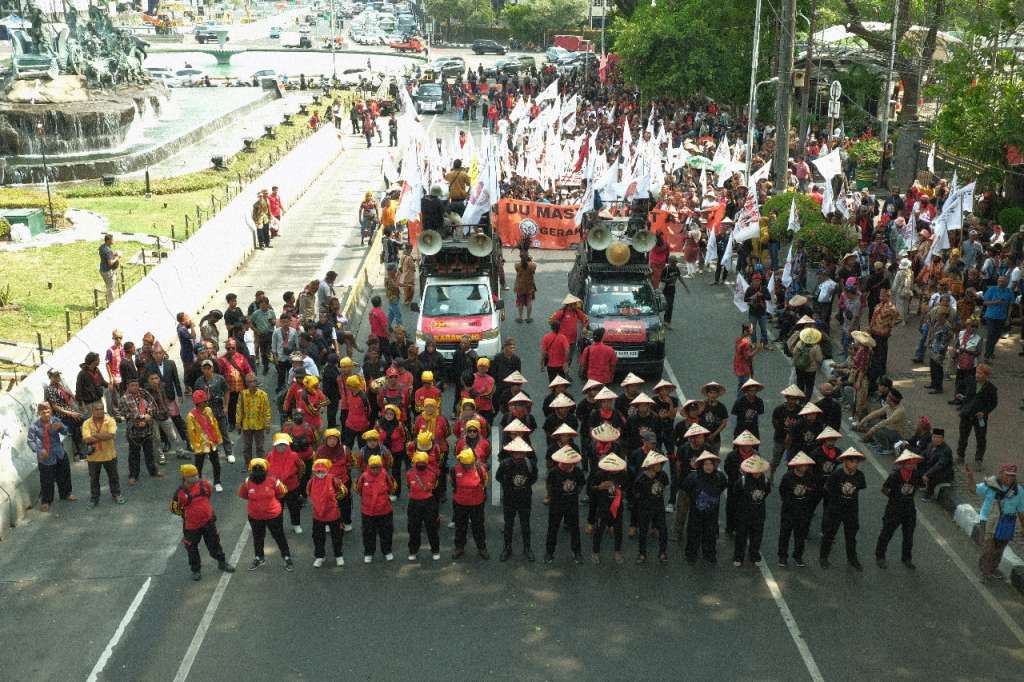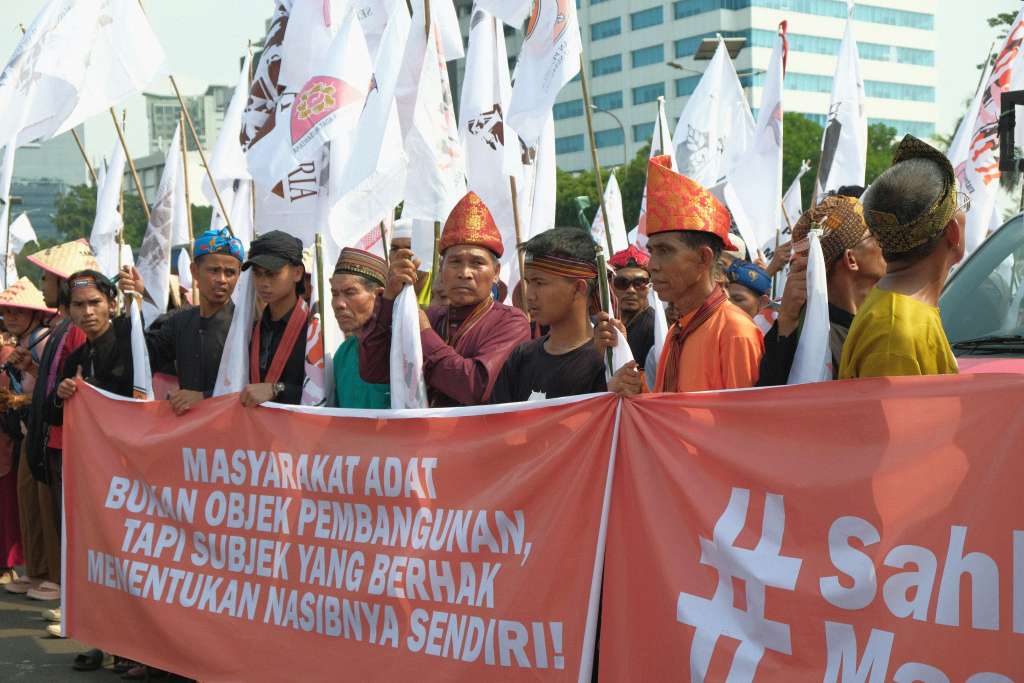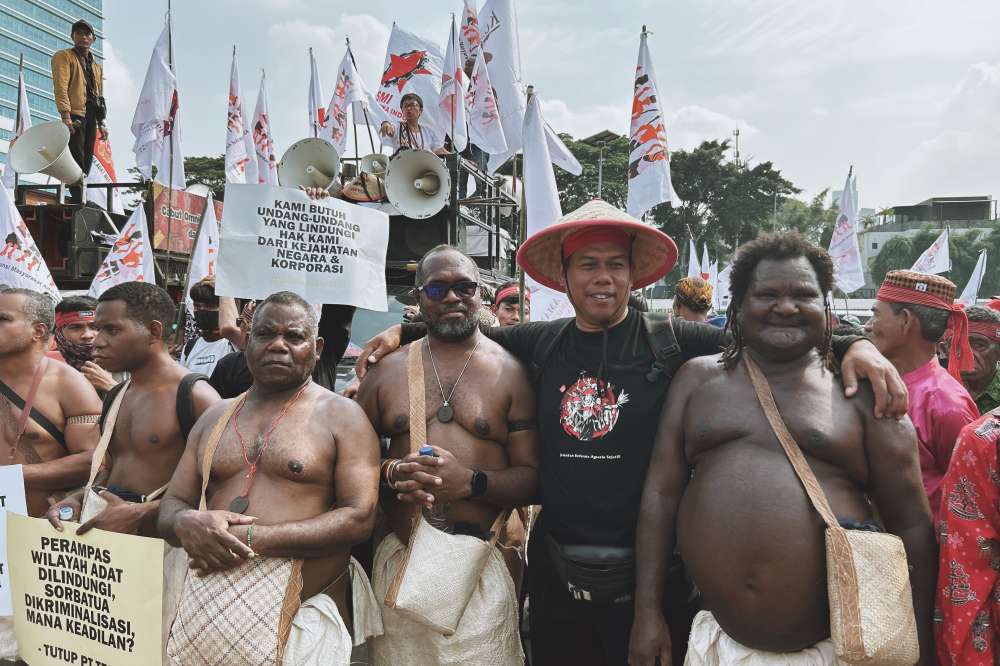
A decade of Joko Widodo’s regime has left a legacy of sins against Indigenous Peoples. This regime has betrayed the 1945 Constitution, gone back on its political promises, and failed to protect the people. There has been no goodwill shown by the government for the interests and support of Indigenous Peoples. In fact, most government policies are oriented towards the expansion and strengthening of the business sector, with power being used to perpetuate oligarchic interests.
This issue is evidenced by various legal products such as the revision of the Mineral and Coal Law, the Job Creation Law, the Nusantara Capital City Law, and the enactment of the Law Book of Penal Code (KUHP). Some of these laws have been designed and enacted specifically to deny the existence of over 40 million Indigenous Peoples and their constitutional rights (AMAN, 2023). The state continues to prioritize legal scenarios that are exploitative and oppressive towards Indigenous Peoples. This is reflected in the complicated, intricate, and sectoral nature of legal recognition for Indigenous communities and their territories. In many cases, there are attempts to separate the recognition process of land rights from Indigenous Peoples themselves, excluding conflict-affected Indigenous areas from government targets. This means that President Joko Widodo and his Cabinet do not genuinely have the political will to recognize, respect, and protect the constitutional rights of Indigenous Peoples.


Because the direction of economic development and policies is controlled by investors, with the Parliament (DPR) itself as the law maker, has been influenced by business interests, it is now difficult to distinguish between representatives of the people and corporate representatives, as 55% of DPR members are entrepreneurs, with 26% of them being large-scale business owners (Marepus Corner, 2023). This has resulted in the rapid establishment of laws and policies that legalize the monopoly of agrarian resources and other natural wealth for the benefit of entrepreneurs.
A decade of Jokowi’s governance reflects the absolutism of power, characterized by the strengthening of executive authority, the weakening of the legislative function, and the disappearance of opposition. We are facing a political reality where power operates without interruption. As a result, anything that contradicts the government interests is ignored or even rejected through various modes of political suppression. Ultimately, this decade of Joko Widodo’s governance has triggered a multidimensional crisis, including political, social, ecological, agrarian, and legal crises.
Here are the crimes of the Jokowi’s regime against Indigenous Peoples from 2014 to 2024:
First, the Jokowi regime has openly undermined the Indigenous Peoples Draft Law (RUU Masyarakat Adat), which was the hope for all Indigenous Peoples in Nusantara. By rejecting the discussion and enactment of this law, President Joko Widodo has deliberately allowed Indigenous Peoples to live without legal guarantees for recognition, protection, and fulfilment of their constitutional rights. Additionally, the political promises outlined in Jokowi’s Six NAWACITA related to Indigenous Peoples have been completely forgotten.
On the contrary, for the benefit of business and political elites, President Joko Widodo has forced the formation and enactment of the job creation law or the CILAKA Law. Hundreds of thousands of students, Indigenous Peoples, workers, farmers, fishermen, and women across the nation took to the streets to oppose it. The passage of this flawed CILAKA Law was done quietly, disregarding the widespread public opposition. Its contents even revive problematic articles that have been declared unconstitutional by the Constitutional Court.
Second, the seizure of Indigenous lands for the relocation of the Nusantara Capital City (IKN) to North Penajam Paser (PPU) and Kutai Kartanegara (Kukar). The IKN, constructed solely based on Joko Widodo’s personal desires and a handful of business elites, has deprived Indigenous Peoples of their full and effective right for participation in decisions that directly affect them. Furthermore, the designation of the IKN location in August 2019 was carried out without the consent of the Indigenous landowners, and there were even numerous agrarian conflicts in the area that the government has never resolved.
The careless designation of the IKN location was followed by the rapid enactment of the IKN Law, which was practically discussed in just 17 days. The Strategic Environmental Assessment (KLHS) was similarly rushed. The assessment published by the government was essentially a quick KLHS, conducted after the new capital was designated in East Kalimantan, rather than an analysis explaining why East Kalimantan was chosen over other regions.
Currently, as much as 51 Indigenous communities spread across North Penajam Paser (PPU) and Kutai Kartanegara (Kukar) face uncertainty regarding their fate and future due to the lack of legal guarantees for the recognition and protection of their long-held rights to ancestral lands. The entire Indigenous territories of the Balik Sepaku community in North Penajam Paser, covering 40,087.61 hectares in total, fall within the IKN development area. This has positioned the Balik Sepaku Indigenous community as a group at risk of extinction due to the IKN development (AMAN, 2022). In contrast, entrepreneurs have been granted privileges by the state to seize and monopolize the lands of Indigenous Peoples, farmers, fishermen, women, and traditional cultivators in the IKN area, with the 190 years allocated for land use rights (HGU) and 160 years for building use rights (HGB) given to them.
Third, land seizures have occurred very rapidly during Joko Widodo’s governance. AMAN reports a total of 687 agrarian conflicts affecting Indigenous territories spanning 11.07 million hectares (AMAN, 2024). More than 925 Indigenous individuals have been victim of criminalization due to these land seizures, with 60 Indigenous people facing repression, and some have even lost their lives. The crimes of Joko Widodo’s government have also impacted farmers, agricultural workers, fishermen, and women. Over the past decade, there have been 2,939 agrarian conflicts, with 6.30 million hectares of community land seized for business purposes (KPA, 2023). Unfortunately, the handling of such agrarian conflicts has been repressive, leading to the criminalization of 1,054 individuals defending their land and environmental rights by the police (WALHI, 2024).
These agrarian conflicts are also the consequence of Joko Widodo’s government’s disregard for MPR Decree No. IX of 2001 on Agrarian Reform and Natural Resource Management. The government, who creates legislation that discriminates against Indigenous Peoples, farmers, traditional cultivators, women, and fishermen, has failed to develop policies for conflict resolution and to synchronize and harmonize a just legislation in the natural resource sector for Indigenous Peoples, farmers, fishermen, traditional cultivators, women, and other marginalized groups.
Fourth, the misleading recognition of Indigenous territories through social forestry. While the goal of social forestry is to provide communities with access to forest management, the values and principles of social forestry cannot equate to full recognition of Indigenous territories. This is because Indigenous forests are those classified as the property of Indigenous Peoples, located within their ancestral lands, as affirmed by the Constitutional Court’s Decision No. 35 of 2012.
Moreover, the Ministry of Environment and Forestry has used social forestry to seize 240,000 hectares of Indigenous land, using the fact that it has been used as social forestry locations as the reason of the seizing (AMAN, 2021). Even worse, the seizing of communities land with social forestry as the reasoning in in Java, now as much as 1.1 million hectares of land, villages, and communities have been unilaterally claimed by the Minister of Environment and Forestry as special management forest areas (KHDPK). Social forests (such as HD, HKm, HTR, Village Forests, and Partnership Forests) has become a licensing scheme that effectively turn Indigenous Peoples, farmers, agricultural workers, and fishermen into tenants of land leased by the Ministry of Environment and Forestry (MoEF), thereby legitimizing illegal claims to forest areas.
The Ministry of Environment and Forestry who positions the recognition of Indigenous forests through social forestry has led to discrimination and complicating the restoration and recognition of Indigenous Peoples’ rights, particularly concerning forests. Additionally, there are overlapping regulations between social forestry and the recognition of Indigenous forests within ancestral lands. Articles 29A and 29B of the Job Creation Law reinforce the status of social forestry from ministerial regulations to the level of national law. Meanwhile, the Job Creation Law does not amend Article 67 of the Forestry Law, which requires the recognition of Indigenous Peoples through regional regulations (Perda).
Fifth, the revival of new colonial practices through the claim of Management Rights (HPL). The sources of land for HPL, regulated under Government Regulation No. 18/2021 about Management Rights, can include uncertified land and even communal land to be treated as state land. Because of this flawed reasoning, it has led the Ministry of Agrarian Affairs and Spatial Planning (ATR/BPN) to enact ATR/BPN Regulation No. 14/2024 on the Administration of Land and Registration of Customary Land Rights. This regulation serves as a basis for issuing HPL over customary land, worsen the control of state rights (HMN) and communal authority.
In fact, the Constitution and the Basic Agrarian Law (UUPA) clearly stipulate that Indigenous Peoples have full rights and authority to manage their lands. This is outlined in Article 18B (2) and 28I (3) of the 1945 Constitution, Article 2 of the UUPA, and the Constitutional Court’s Decision No. 35. The issuance of HPL certificates for communal lands and territories without the genuine consent of Indigenous Peoples makes it increasingly easy for entrepreneurs to seize and trade these lands in a liberal land market.
Sixth, the Jokowi administration has offered false solutions to address the climate crisis through carbon markets. The policy package aimed at tackling the climate crisis is reflected in the 2020-2024 National Medium-Term Development Plan (RPJMN), where carbon trading has become one of the Indonesian government’s priority programs. To implement this, the government has introduced policies that integrate environmental permits and business licensing in sectors such as forestry, mining, and plantations, facilitating business actors to obtain direct management authority over carbon emissions from their activities. This approach is also evident in the legal framework of the Job Creation Law.
The government has completely excluded Indigenous Peoples and local communities as key actors in the effort to combat the climate crisis. Policies such as Presidential Regulation No. 98/2021, Law No. 7/2021 on Tax Harmonization, and other derivative regulations have instead been used to grant impunity to corporations that harm nature and the environment, allowing them to seize the living spaces of Indigenous Peoples, farmers, fishermen, traditional cultivators, women, and other marginalized groups. In fact, from 2013 to 2017, Indonesia lost 23.5 million hectares of natural forest primarily due to various licensing concessions, including mining, plantations, forestry operations, and infrastructure projects (FWI, 2019). The number of people at risk of becoming victims of the climate crisis reaches 104 million residents living in Indonesia’s coastal areas (WALHI, 2024).
Seventh, the administration has pursued false environmental protection solutions. The Jokowi government continues to prioritize fossil fuels as a source of electricity generation. The mining industry was even granted the “red carpet” through revisions to the Mineral and Coal Law. Indigenous territories covering as much as 1,919,708 hectares, which are essential for Indigenous Peoples’ livelihoods, have been seized for mining concessions (AMAN, 2019).
Amid the discourse on energy transition following the signing of the Paris Agreement in 2015, President Jokowi issued Presidential Regulation No. 112/2022 on the Acceleration of Renewable Energy Development for Electricity Supply. This policy is just one of many used by entrepreneurs to expand their businesses and invade community lands for strategic national projects (PSN), such as coal power plants, nickel extraction, and biodiesel and bioethanol production, etc. Ultimately, the concept of Indonesia’s Forest and Other Land Use (FOLU) merely serves as an opportunity to further strengthen business interests under the guise of green policies.
Not only are captive coal power plants being built to support the energy business, but large-scale hydropower plants, such as those in Poso, are also constructed to ensure electricity supply for mining operations, particularly for mine refinement. A Green Industrial Zone totaling 30,000 hectares has been prepared as an industrial sector hub focused on the downstream processing of mining products, claimed to support the IKN. However, this “green industry” is nothing more than a façade, as it is built on top of fossil extraction and burning.
Geothermal projects in the Poco Leok Indigenous Community in Manggarai, NTT, and biomass power plants (PLTBm) fueled by wood, developed by Medco Group, have cleared large areas of Papua’s natural forests to establish industrial tree plantations (HTI), directly violating the rights of the Poco Leok Indigenous community in NTT and the Marind people in Merauke, Papua.
Multiple facts about energy transition which currently being discussed and implemented are no more than a ruse by capitalists to continue extracting fossil fuels to sustain industrialization. Concepts like energy transition, zero emissions, carbon neutrality, and decarbonization are merely business “keywords” used to maximize fossil extraction as much as possible and release emissions in order to be able to sustain the energy industry itself. Energy is framed within a business context, so that what is termed “green energy” or “just energy” will never truly exist.
Eighth, the government is reinforcing threats to Indigenous territories through the claim of conservation areas. Instead of reorganizing conservation zones that have long been in conflict with Indigenous Peoples, Law No. 32 of 2024 on the Conservation of Biological Natural Resources and Ecosystems (UU KSDAHE), enacted on July 9, 2024, further centralizes the unilateral designation of conservation areas by the state. Indigenous Peoples are not afforded the opportunity to participate fully and effectively in determining conservation areas based on customary law and traditional knowledge they have practiced for generations. Even though, for Indigenous Peoples, conservation practices are an integral part of their way of life.
Moreover, the new UU KSDAHE specifies preservation areas, which include areas outside of conservation areas (KSA), protected areas (KPA), and conservation zones in waters, coastal regions, and small islands (KKPWP2K). The addition of these preservation criteria comes with the requirement for every rights holder to relinquish their land rights if they are unwilling to engage in conservation activities. This eco-fascist policy poses a real threat that could displace Indigenous Peoples, farmers, fishermen, and traditional cultivators from their homes. This situation places Indigenous Peoples, farmers, fishermen, and traditional cultivators in a vulnerable position, exposed to violence and criminalization in the name of conservation.
Ninth, the government is strengthening corporate control over Indonesia’s natural wealth through Food Estates and the Land Bank. Due to the injustices of the Jokowi administration, particularly with the enactment of the Job Creation Law, political elites and businesspeople are legally empowered to dominate land. The Land Bank, as something created under the pressure from investors, will undoubtedly facilitate land provision to boost economic growth and investment while ensuring the extension and renewal of land rights. Through the Land Bank, 7.4 million hectares of land formerly designated for business rights (HGU) will be controlled before being resold to investors.
Similar fate is faced by Indigenous communities across various regions whose land was seized in the name of food industry development or food estates. Instead of empowering Indigenous Peoples, fishermen, and farmers as primary food producers, President Jokowi has opted to replace them with business interests. Consequently, land and food are increasingly commodified, supported by legal frameworks that do not favor farmers, agricultural workers, Indigenous Peoples, fishermen, and women. Both the Land Bank and food estates undermine the agrarian reform agenda while distancing the recognition of Indigenous lands and territories.
Tenth, the co-optation of communal law into state law through the Indonesian Law Book of Penal Code (KUHP) introduced by the Jokowi administration aims to grant the executive significant authority. The incorporation of communal law into the KUHP can be seen as an effort to “co-opt” these legal traditions, leading to several consequences: the diminishing dynamic character of communal law; the stripping away of Indigenous Peoples’ rights to practice their customary justice systems, which have been passed down through generations; and the transfer of jurisdiction over customary law from Indigenous Peoples to the state, effectively placing it entirely within state authority.
Eleventh, the transition of power is being conducted in anti-democratic ways. President Jokowi’s alignment with the 2024 presidential election signals a strong intent to prolong his power by collaborating with major investors who will continue to encroach on Indigenous territories under the guise of national strategic projects. Furthermore, the era of President Jokowi, which emerged from a democratic process, has ironically undermined democracy. This is evident in his blatant nepotism, mobilizing state apparatus for personal interests, weakening the authority of the Corruption Eradication Commission (KPK), intervening in the judiciary, and favoring oligarchs through policies that do not align with the public’s interests.
On Tuesday, October 1, 2024, representatives resulting from the 2024 elections were officially appointed to the Indonesian House of Representatives (DPR RI). According to data from the Indonesian Parliamentary Center (IPC) (2024), the composition of the DPR RI for the 2024-2029 period is predominantly dominated by incumbents, with 327 out of 580 parliamentary seats held by current members. Additionally, IPC findings reveal that 11.6% of the elected DPR members are affiliated with political dynasties, while 16.9% are businesspeople. The DPR plays a strategic role in lawmaking, development budgeting, and overseeing government performance. Therefore, we reject all forms of abuse of power or collusion that can erode public trust.
Based on the above views, we, the People’s Movement to Safeguard Indigenous Peoples (GERAK MASA), demand accountability from President Jokowi for violations of the constitutional rights of Indigenous Peoples. We also urge the incoming Prabowo-Gibran administration to be more decisive and consistent in recognizing, protecting, and fulfilling the rights of Indigenous Peoples during their term, by taking the following concrete actions:
- We urge the Prabowo-Gibran government to enact the Indigenous Peoples Bill within the first 100 days of their administration. This law will serve as a strong legal foundation to recognize and protect our rights, as well as provide legal certainty for the Indigenous territories that have long been neglected.
- We call for the accelerate recognition of rights over Indigenous territories and the resolution of agrarian conflicts that have been stalled in the Cabinet of President Jokowi, while halting all land seizures for national strategic projects, business interests, and other pro-investor policies on Indigenous lands.
- We demand President Prabowo to have the courage to revoke the Job Creation Law, the Natural Resources Conservation Law, the Mineral and Coal Law, and various other discriminatory regulations against Indigenous Peoples, farmers, fishermen, workers, women, and other marginalized groups.
- We urge President Prabowo to restore the sovereignty of the Indonesian nation over its land and natural resources and to achieve welfare by implementing genuine agrarian reform in accordance with the constitutional mandate, the MPR Decree No. IX of 2001, and the 1960 Agrarian Law (UUPA).
- We urge the Prabowo-Gibran government to ensure legal protection for Indigenous Peoples and their defenders who advocate for their territorial rights. The Prabowo administration must uphold the rule of law without favoring the interests of capital or large corporations.
- We urge the Prabowo-Gibran administration to guarantee full and effective participation of Indigenous Peoples, farmers, fishermen, women, and other community groups in every decision-making process that will directly impact them.
- We urge the Prabowo-Gibran administration to do environmental restoration and enforce the law against corporations that commit environmental crimes and human rights violations.
- We ask the Prabowo government to support efforts to preserve culture and provide education that aligns with local wisdom. Education that respects local languages, values, and knowledge will strengthen our identity and ensure the continuity of Indigenous cultures amidst globalization, rather than merely symbolizing it through traditional attire at state events. This is our political statement as Indigenous Peoples across the archipelago. Long live the struggle. Uphold the Constitution: Restore the rights of Indigenous Peoples, Enact the Indigenous Peoples Bill!
Spokespeople:
- Rukka Sombolinggi (Secretary General of AMAN)
- Eustobio (Deputy Secretary General of AMAN for Organization Matter)
- Erasmus Cahyadi (Deputy Secretary General of AMAN for Politics Matter)
Media Communication Coordinator:
Titi Pangestu (Director of Information and Communication AMAN) – 081317897062
People’s Movement to Guard Indigenous Peoples (GERAK MASA)
- Alliance of Indigenous Peoples of the Archipelago (AMAN)
- Association of Defenders of Indigenous Peoples of Nusantara (PPMAN)
- Women of AMAN
- Alliance of Indigenous Youth of Nusantara (BPAN)
- Coalition to Guard the Indigenous Peoples Bill
- Consortium for Agrarian Reform (KPA)
- Indonesian Forum for the Environment (WALHI)
- Congress of Indonesian Trade Union Alliances (KASBI)
- Agency for the Registration of Indigenous Territories (BRWA)
- Sajogyo Institute
- Kaoem Telapak
- Coalition of the People for Fisheries Justice (KIARA)
- Greenpeace Indonesia
- Indonesian Student Union (SMI)
- Indonesian Christian Student Movement (GMKI)
- Front for Indonesian Youth Struggle (FPPI)
- Pembebasan
- Forest Watch Indonesia (FWI)
- KEMITRAAN – Partnership for Governance Reform in Indonesia
- Sawit Watch
- HuMa Association
- Indonesian Legal Aid Foundation (YLBHI)
****



